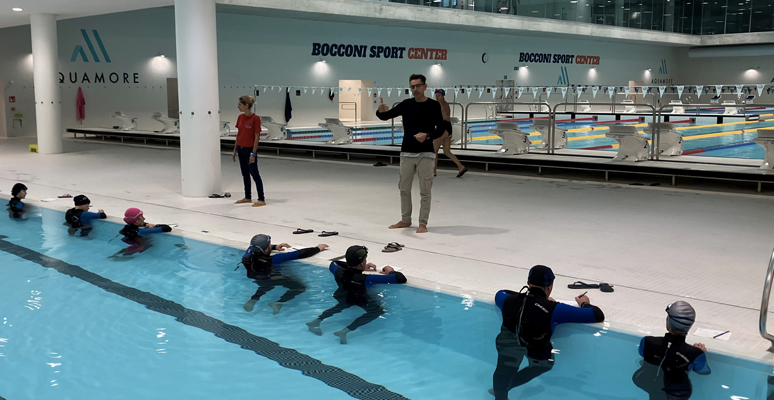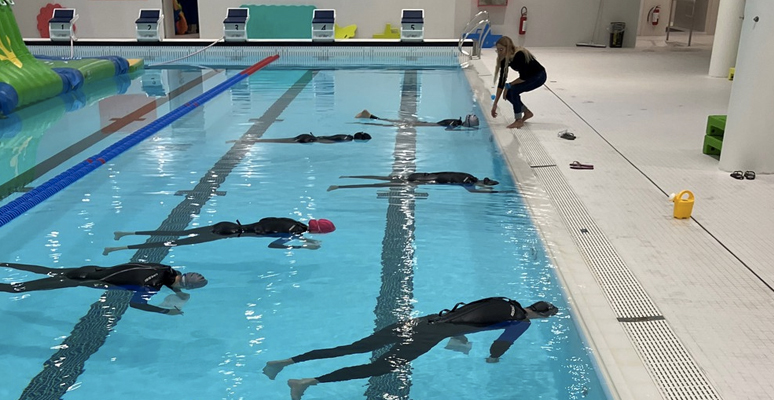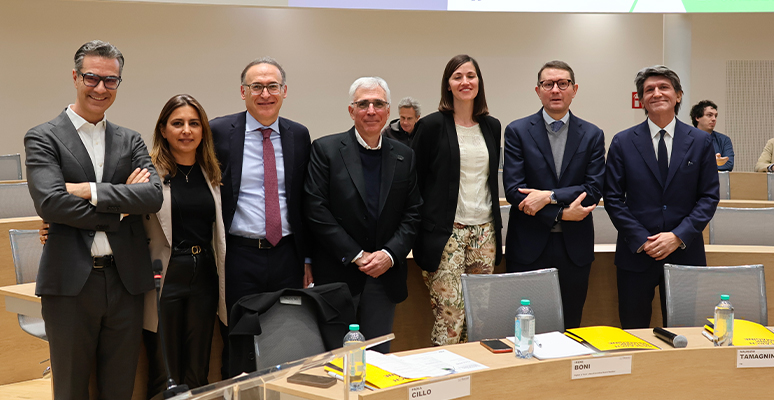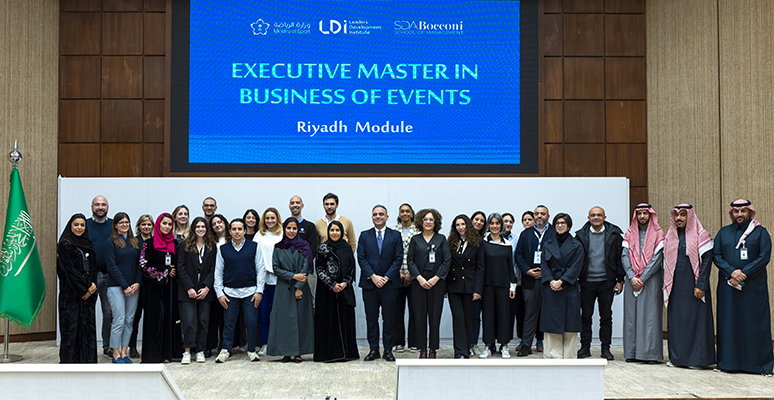
- Start date
- Duration
- Format
- Language
- 5 May 2025
- 9 days
- Class
- Italian
Affrontare le sfide attuali della funzione HR a 360 gradi, grazie a strumenti metodologici per attrarre, scegliere e trattenere in azienda i migliori talenti.
In recent months, the Aquamore pool at the Bocconi Sport Center has been the scene of experimental research aimed at evaluating the effectiveness of two neurocognitive enhancement protocols in managers subjected to repeated stress conditions.
The project was a collaboration between SDA Bocconi School of Management, the International research center for Cognitive Applied Neuroscience (IrcCAN) at Milan’s Università Cattolica and the Associazione Facilitatori Risorse Umane (AFRU). On the one hand, the study confirmed the effectiveness of a neuroempowerment protocol already designed and validated by IrcCAN, which combines mindfulness practices and a wearable neurofeedback tool, a smart band connected to an app capable of detecting and monitoring brain responses during meditation exercises, offering the practitioners real-time sound feedback on their levels of concentration or distraction. On the other hand, the study has for the first time scientifically tested the effectiveness of a protocol (Mind~theDeep) based on exercises of breath modification, both while dry and in water, comparing them with the results obtained from the Mindfulness protocol.
Two groups of managers participating in the SDA Bocconi Executive MBA, directed by Renata Trinca Colonel and coordinated by Marco Morelli, a total of 18 people who were perfectly comparable for every relevant variable, were assigned to the two empowerment interventions. The Mindfulness-Neurofeedback group, accompanied by the staff of IrcCAN, underwent short daily mindfulness sessions with the support of the wearable neurofeedback system, conducted independently and with increasing duration (from 5 to 20 minutes) for 4 weeks. The Mind~theDeep group, under the guidance of the AFRU team, participated in 6 90-minute sessions of breath modification in the Aquamore pool of the Bocconi Sport Center (one every two weeks, for a total of 3 months), with additional breathing exercises to be performed independently.
All participants took part in an assessment before and after the intervention in order to measure the effect of the protocols: in an IrcCAN lab, they underwent psychometric tests, neurocognitive tasks and the measurement of the efficiency of cognitive and physiological functions.
Improvements in stress management, self-awareness and emotional regulation were recorded in both cases. The Mind~theDeep group showed, in particular, a greater ability to perceive affective reactions and bodily changes associated with stress states, showing a significant increase in self-awareness, attention regulation, and self-regulation under stress. The Mindfulness-Neurofeedback group also showed specific increases in neurocognitive efficiency and executive functions, a group of mental abilities that includes attention regulation, executive control, cognitive flexibility, problem solving, working memory, strategic planning and logical reasoning.
“The Mind~theDeep protocol derives from a methodology (Deep Inside – State of Mind) that has been successfully applied to top-level athletes from different disciplines by Alessandro Vergendo, a sports mental coach and trainer, who managed this part of the experiment with the AFRU team. While the positive feedback of the Mindfulness-Neurofeedback protocol was expected, due to previous IrcCAN validations, the effects of the Mind~theDeep protocol on a population other than athletes were found to be for some objectives, such as stress control and self-awareness, well above expectations and highly significant,” says Carlo Altomonte, head of the initiative for SDA Bocconi.
“One of the explanations we can hypothesize,” says Alessandro Vergendo of AFRU, “is that diving activates a part of the ancestral brain that we no longer use since we became terrestrial animals, but that is still capable of mobilizing useful resources when we find ourselves operating in the aquatic environment.”
“Although these are still preliminary results, reached by working on a small sample,” Professor Altomonte continues, “the findings are so encouraging that, with my colleague Massimo Magni, coordinator of executive leadership programs at SDA Bocconi, we are thinking about a research program to develop them in a more structured way.”
The results of the experimental research were presented yesterday at Bocconi University.
Discover more about the Executive Master in Business Administration


SDA Bocconi School of Management

Affrontare le sfide attuali della funzione HR a 360 gradi, grazie a strumenti metodologici per attrarre, scegliere e trattenere in azienda i migliori talenti.

Acquisirai il giusto mindset, le competenze tecnico-relazionali e gli strumenti operativi per organizzare e gestire i progetti con efficienza ed efficacia.

Il corso fornisce indicazioni operative volte a ottimizzare la gestione dei dati, valutando le opportunità alternative disponibili per la propria azienda e valorizzando al meglio il contenuto informativo dei dati stessi.

